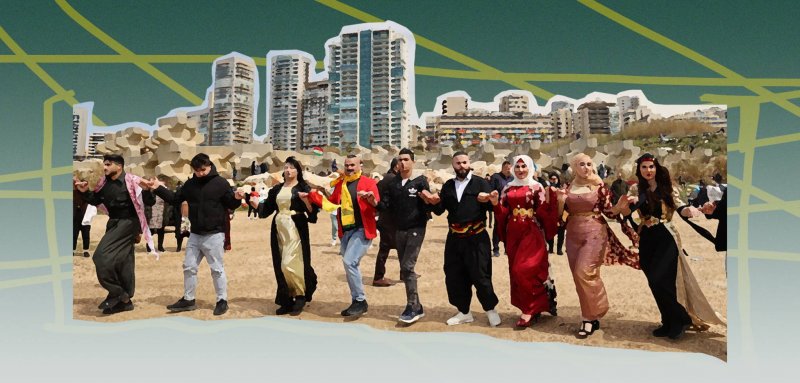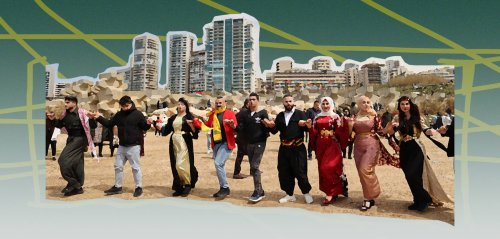"The feeling of belonging to Lebanon is hard on some of us, for the Lebanese government has always treated us as second class citizens. We have been marginalized, faced many obstacles while trying to get the minimum of life necessities, and are considered an exclusive electoral tool. Our children have lost any sense of belongin, some of them have travelled to combat regions, carried weapons to defend their original homeland, Kurdistan, and have sacrificed their lives there."
In these words, Ghazala Saado, a 65-year-old Lebanese Kurd woman, describes the situation of her Lebanese relatives.
Ghazala was born in the Qamishli region of Syria, after her Lebanese parents decided to return to their hometown. But before she finished her first year there, her family moved back to Lebanon. She tells Raseef22 that her grandparents had lived earlier in Beirut’s Borj Hammoud suburb: “my grandfather used to own a property in Corniche Al Naher. He sold it and went back to Syria.”
She said that her grandmother “was not feeling comfortable, because she had then been living away from her family”, so the whole family came back to Syria. However, seven months later, everyone changed his opinion and went back to Lebanon “in order to escape poverty. They settled here ever since.”
Superiority and stereotyping
Ghazala considers herself one of those who “have adjusted to the life here (in Beirut).” She has gotten married to her cousin, who is also Kurd, and they have had three children: two boys and a girl. “The two young men did their military service in the Lebanese army, like any young man at that time.”
In spite of her belief that many Kurds feel that they do not have any sense of belonging to Lebanon, she has never felt the same: “I have never had the feeling that I do not belong here. Our life was easy since my childhood especially that my parents were among the first to obtain the Lebanese citizenship.
“The feeling of belonging to Lebanon is hard on some of us, the Lebanese government has treated us as second class citizens. We've been marginalised, faced many obstacles while trying to get the minimum of life necessities, and are just an electoral tool
However, her sense of belonging to Lebanon did not make her give in her nationalist affiliation. It was a plus. She says: “I have maintained my customs and traditions, have taught my children the Kurdish language and the habits of Kurdish people, and I have recently joined the Newroz association, since it was established in 2014, and participated in all its activities.”
As for her life between non-Kurd Lebanese, she said that she and her family have never faced any problems with “their Beiruti neighbors, in general.” She continues: “We have of course faced some bullying and social isolation here and there, because some Beirutis refuse to get married to Kurds. This refusal goes back to stigmas and social stereotypes from which the demand of the Kurdish bride’s parents of huge amounts of money as “muajjal” (bride price) and “ghair muajjal” (money paid after the completion of marriage).” She does not deny that such traditions exist, but she puts them in context: “These traditions were prevailing between old Kurdish people, and they were caused by feelings of insecurity, estrangement and constant fear of the unknown. Therefore, parents used to see in high amounts of “Mahr” a way to ensure a decent life for their daughters.”
In this context, Hanan Osman, the vice president of Newroz Cultural Association that is involved with the affairs of Kurds in Lebanon, shares some of the popular and discriminating phrases said about Kurds, such as: “do not discuss with him, he has Kurdish brain.” She says that such sayings were spread among the people in the region, from which the Lebanese people, for long years, and they refer to the closed Kurds community and its lack of openness.
“Are you Kurdishing me?” is a common saying in Beirut that means that one person is taking advantage of another one. It also means “are you taking me for a fool (Kurd)?” a sentence that obviously expresses a lot of bullying towards Kurds.”
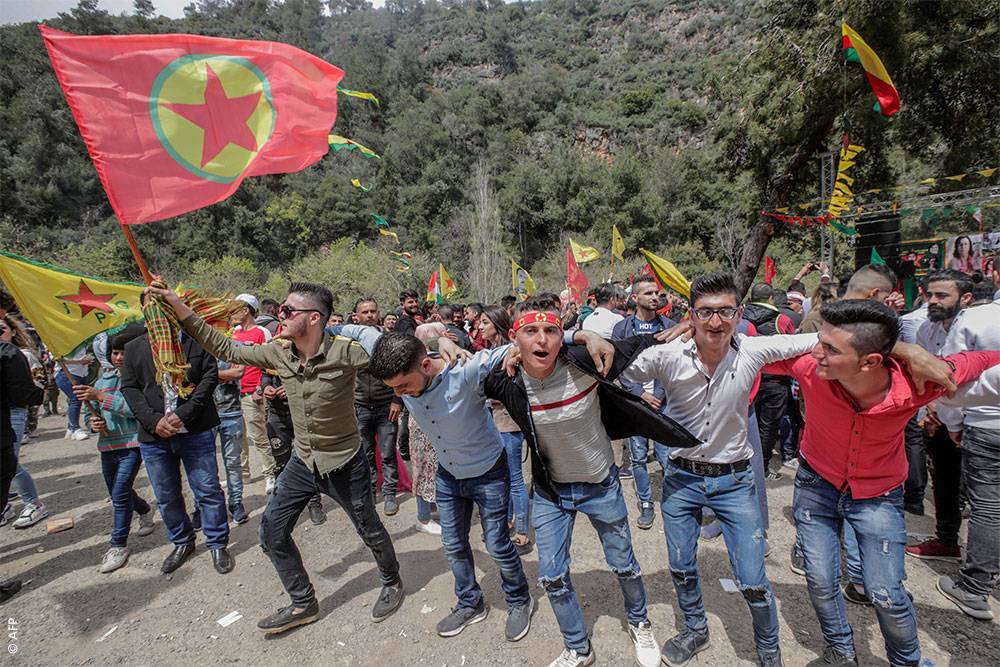
Hanan is, according to her description, a Kurdish woman from a “poor and humble” family. She is daughter to a couple who have migrated from the city of Mardin, located in the Kurdish part of Turkey, to Lebanon, 50 years ago. She was born, studied and lived in Lebanon and she got married to a Kurdish man.
From an early age, she was interested in politics, especially in the matter of Kurdish rights in Lebanon. She has participated in the establishment of “Newroz Cultural Association” in 2014, in order to preserve the Kurdish heritage and teach the Kurdish language to new generations. She has also worked on developing the capabilities and skills of Kurdish women, and has run for parliamentary elections, pushed by her desire to “represent Kurds, improve their conditions, and help them get the rights they deserve.” However, she has only gotten few votes.
The stereotyping of Kurds in Lebanon “has negatively affected the way they were treated on the commercial, cultural and social levels.” Osman explains to Raseef22: “Some Beiruti families avoid marrying their children to Kurds and prefer not to handle any commercial deals with them.”
These things are not outdated. In fact, she stresses: “the inferior look towards Kurds is still prevalent until now, especially towards stateless ones who became like refugees years ago.” These stateless Kurds are forced to “work in a few jobs and businesses with limited income. Of course, they are completely excluded from public administration jobs.”
Despite the fact that the majority of Kurds have gotten the Lebanese citizenship through several stages, a large number of them is still stateless and are deprived from ordinary citizen's rights.
Old and recent history
“Kurdish people have been in Lebanon for hundreds of years. Their cities have always been known to be unstable so they used to escape from the oppression to seek safety and stability in the mountains. Therefore, they were known by the name of “people of the mountains,” according to the member of Beirut Municipal Council, Adnan Amirat.
Amirat was the first Lebanese Kurd to enter Beirut Municipal Council, the fact that was considered strange in representing a class that, according to the estimation of some, includes 25,000 voters in the Lebanese capital. He says that the Kurdish migration to Lebanon has occurred in two main waves: the first included Feudal lords, princes, and clans who had lived on the fringes of the ancient ruling Greek, Persian and Egyptian empires. They migrated owing to the constant conflicts in order to defend the sea frontiers and fight the Crusader kingdoms. “They have settled in several areas, including those that later formed Greater Lebanon.” For instance, “the Maraaba, the Ayyubid princes, the Jumblatt princes, and large clans such as Bani Alam al-Din and Bani Hamiyah” were families that have immigrated to Lebanon. “These families have adapted as Lebanese families who do not speak Kurdish and whose members are related to the Kurds of Syria and Iraq only through phone calls and leadership visits to celebrate national holidays, just like Jumblatt family does.”
As for the second wave of migration, Amirat continues to say that it is recent and that “it happened during the First World War, after the decline of the Ottoman Empire and its transformation into a secular state under the name of the modern Republic of Turkey.” During this second wave, many Kurds have migrated to Syria and Lebanon, especially to some strategic cities such as Beirut and Tripoli, escaping turbulences and searching for better life chances.
“The history of Kurds has been instable, and their constant migration through rugged mountains has affected their way of living,” says Amirat to Raseef22. “They subsisted on agriculture using primitive methods, the fact that affected the type of work they practiced in Lebanon. They worked in low paying jobs that do not require skills or high competences. They have also worked in factories that needed cheap labor and in limited trade.”
The majority of Kurds migrating to Beirut have first lived “in huts in neighborhoods adjacent to factories.” “These neighborhoods were poverty hotspots from which the street of Charchabouk and other streets in the region of Karantina in northeast of Beirut. As the rest of minorities at the time, they have fallen prey to capitalism and to the neglect and marginalization of the Lebanese Republic, before resettling in other regions.”
Kurds and Mardinites
The first Kurds that arrived to Lebanon, after the First World War, have originally come from Turkey to escape the oppression of Turkish soldiers. Their homeland had experienced a rise of a Turkish extremist and nationalist wave that occurred after the fall of the Ottoman Empire. They were known by Kurmanjis due to a description referring to the region of their presence within Kurdistan and the dialect in which they speak.
Additionally, there was also “Mardinites”, a name attributed to the people of Mardin, a Kurdish-majority province from which Kurds came and that is located in southeast of Turkey, on the borders with Syria. This name is a distortion of their description in Turkish “Mardin-li”.
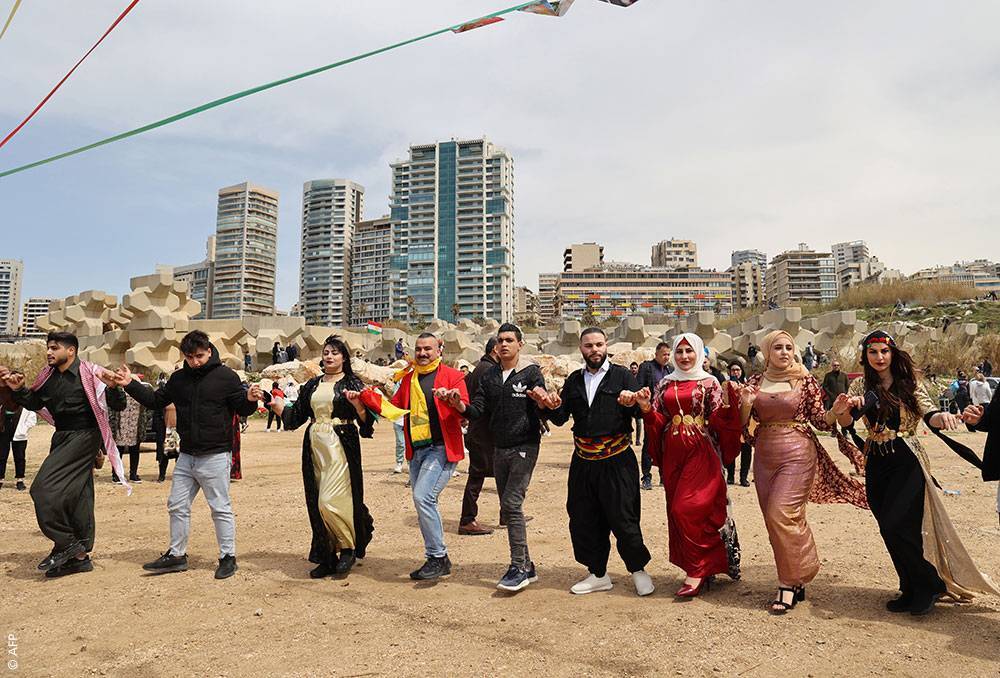
The villages of the Mardin province include Kurds and other nationalities. Kurds are Kurmanjis who speak Kurdish whereas the title of Mardinites has remained for those who speak Arabic. “However,” says Amirat, “the Lebanese people have identified all of them as Kurds, owing to their unified history, customs and culture.”
As an explanation to why the Lebanese identified everyone as Kurds, the story goes that Arab Mardinites claimed to be Kurds in order to receive the same privileged treatment that the Kurmanjis received from the French Mandate authorities. According to Mustapha Fakhro, president of the Lebanese Active Intellect, an association that aims to encourage social solidarity in Beirut and Lebanon, the first Arab Mardinites that came to Lebanon “used to talk in Kurdish, influenced by their neighbors in Mardin.”
The long journey to naturalization
When Kurds arrived to Lebanon in the second wave of migration, the mayors of the towns they lived in gave them documents that allowed them to move, however, they did not get the Lebanese citizenship, unlike the Armenian people who have come to Lebanon around the same time.
According to Amirat, “there were many reasons for which Kurds were not naturalized, mostly because of the sectarian balance on which Lebanon is based. Further, France was counting on the Armenians as a political force that could be used in later political programs, unlike the Kurds who did not receive direct political or international cover.”
Shrtly after the Mardinite and Kurdish arrival to Lebanon, the French mandate authorities accepted to give them residence permits valid for five years, a period after which they were promised to be naturalized. It remained the same until the withdrawal of the French troops from Lebanon in 1943, as explained by Amirat. Under these procedures, few of the Kurds have obtained citizenship especially that the residence permit was given “in exchange of an amount of money that not many families could afford.”
After Lebanon’s independence, stateless Kurds became “unidentified,” not holding any citizenship or paper trail, says Amirat. “They became unable to enter schools or get jobs.”
Later on, “the Lebanese government made it possible for stateless people to register their names so that their cases be studied, but some of them refrained from doing so, fearing that the government’s goal was to get them departed.
In 1948, the Palestinian exodus (Al Nakba) occurred, and many Palestinians flew their homeland to Lebanon. Owing to the fact that the majority of them were Sunnis, the Kurdish naturalization file got even harder in a country whose sectarian system is based on precise balances and constant sectarian concerns related to numbers. “Kurds were marginalized because of both their ethnicity and because of their religion on the Lebanese level,” according to Amirat.
During the beginning of the 1950s, fewer than twenty Kurds were naturalized, after they were registered as Christian, the fact that provoked the ire of Sunnis religious leaders. Consequently, the then Prime Minister Sami Solh issued a naturalization decree that included large numbers of Kurdish families, in 1956. By doing so, he entered the historical memory of Kurds as “Father Sami.”
As for the rest, who were a majority of Kurds, their naturalization issue remained subject to political whims. In the 1960s, the application of Article 1 of the Lebanese Nationality Law was activated, stating that the Lebanese citizenship is given to “every person born in the territory of Greater Lebanon with no proof of acquiring a foreign nationality by filiation at birth.” It is also given to “every person born in the territory of Greater Lebanon to unknown parents or to parents of unknown affiliation.” Some families took advantage of this administrative procedure, until it was suspended due to sectarian differences.
Lastly, in 1994, a decree was issued to naturalize tens of thousands of people including ten thousand Kurds.
Some figures estimate that 40% of the Kurds currently residing in Lebanon do not possess the Lebanese citizenship.
Kurds and political parties
According to Hanan Osman: “The standardizing outlook from which Kurds were socially seen reflects the inferior and exploitative way that the traditional parties, in Lebanon generally and in Beirut specifically, have always treated this people. These political parties have exploited Kurdish people for years in order to gain their electoral votes, especially because of their electoral importance.”
Osman narrates that “political visits to Kurds and the act of listening to their demands would happen only days before elections.” She adds: “If a young man was looking for a job, he would have to await the elections in order to seek the help of those in the running. Only then might he get the golden opportunity to be employed in one of the jobs reserved for the Sunnis. As for the unkept promises, they appear hours after the election results are released.
Until today, not a single Kurdish deputy has entered the Lebanese parliament. This is a summary of the discrimination, stereotyping and racism Kurds have endured for about a century in Lebanon
Until today, not a single Kurdish deputy has entered the Lebanese parliament, and Adnan Amirat was the only one to enter Beirut Municipal Council. In fact, he was on a list made by the Fututre Movement while the number of candidates was very few compared to the number of voters estimated at 25,000.
Osman herself was in the running for the parliamentary elections in 2018. About the way Beirutis handled her candidacy, she says: “Some have told me: who are you to obtain a seat in Beirut?” She adds: “Every party cares about its people and considers the seat as their right. They will not let the Sunni seat in Beirut go to a Kurd.”
The fact that Kurds did not establish strong political parties made it hard for them to be politically represented, and “not obtaining the Lebanese citizenship impeded their joining and establishing associations, or engaging in any partisan activity,” says to Amirat.
Lebanon has witnessed the foundation of many Kurdish parties, but none of them has succeeded. Thus, the majority of them remained in the space of the active Sunni parties in Beirut, as a part of Beiruti entity. For instance, Future Movement was one of these parties for the past three decades, before its decline in the past years. An important number of Kurds were part of the Association of Islamic Charitable Projects and others part of the Islamic Group, in addition to another group of Kurds that were close to the Shiite representatives: Hezbollah and Amal Movement.
The establishment of a Kurdish party was hindered by the fact Kurds are divided between Kurmanjis and Mardinites. “Kurmanjis believe in the unity of Kurds despite their geographic distribution, whereas Mardinites hold on to Arab nationalism.”
The establishment of a Kurdish party was hindered by the fact Kurds are divided between Kurmanjis and Mardinites. “Kurmanjis believe in the unity of Kurds despite their geographic distribution, whereas Mardinites hold on to Arab nationalism.”
Lokman Meho, president of The Lebanese Kurdish Association for Social Services says to Raseef22: “After years of sacrifices made by martyrs for the sake of this country, we want political representation to convey our demands. It is our right and the right of those who live on this land to participate in decision-making.”
Between Kurds and Armenians
There is a lot of comparison, among the Kurds of Lebanon, between the reality of Kurds and the reality of Armenians. In fat, all the Armenian people obtained the Lebanese citizenship without going through what Kurds had endured. They were also represented in the parliament as a religious sect, as stated by the Lebanese system, unlike Kurds whose specific nationalism is not noticed by the sectarian system who identifies them as Sunnis.
Jamal Hassan, president of Newroz Cultural Association mentioned to Rassef22: “Despite the fact that Kurds and Armenians had migrated for the same reason which is the oppression of the Turkish army, the different ways by which the two people were treated resulted from the French Mandate.”
He adds: “The French authorities had built specific schools to teach the Armenian language. Therefore, Armenians were able to have their own society within the Lebanese entity. They have preserved their language and culture and they were able to learn and obtain high-ranking jobs in the state, in addition to a part of government jobs that were allocated to them. Such measures were not taken to maintain the Kurdish structure. On the contrary, Kurds were integrated with the Sunni community.”
On another hand, Hassan sheds light on the difference between the capabilities of the Armenians and the Kurds when they came to Lebanon, because “when the Armenians first came here, they were armed with high quality handicrafts, a good educational level and high economic culture. Therefore, they were able to build their own model that was capable of breaking through the state facilities, unlike Kurds who migrated through the mountains with primitive capacities.”
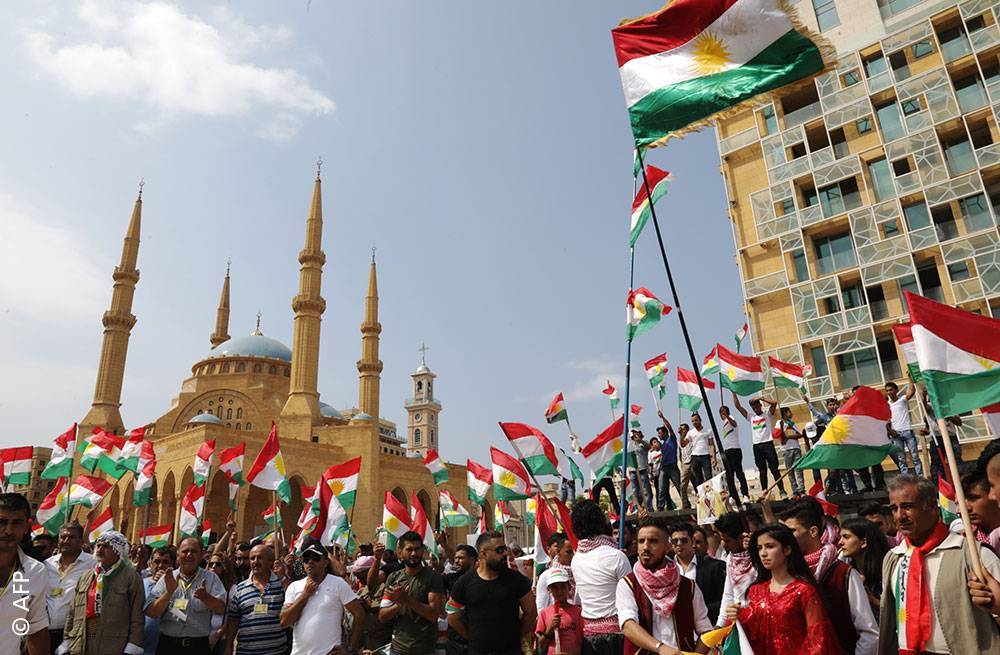
Between belonging and estrangement
When it comes to the matter of belonging to Lebanon, Jamal Hassan differentiates between the naturalized and the stateless Kurds. He says: “After a long period of time, naturalized Kurds were able to blend in the Beiruti society, and some of them became religious and political leaders. As for the stateless Kurds, some of them maintained the Kurdish heritage and traditions, became much more closed because they were unwelcomed, and lived within specific populations. Others were afraid of integration in the hope of returning to their motherland. Until now they are less integrated on the social, economic, commercial and other levels.”
“I was afraid to participate in movements to claim my rights by fear of being told: “It is none of your business,” says the 20-year-old Farah Darwich whose mother is Lebanese Kurd and father Syrian Kurd and who does not hold the Lebanese citizenship, because Lebanese women are deprived of their right to pass their nationality to their children.
Farah was born in Lebanon and lived all her life here. She is an activist interested in the rights of marginalized groups and minorities like her. In her childhood, her parents used to take her to activities that allow her to get to know her nationality and to preserve her heritage. However, once older, she no longer participated in Kurdish activities and became interested in demanding the rights of Kurds and marginalized people like her.
In 2015, when protests known by “You Stink Movement” erupted, raising objections against the accumulation of waste in the streets of Beirut and the state's inability to address the crisis, Farah wanted to take to the streets but did not by fear of being arrested. She says to Raseef22: “What would they do, if the arrested me? I am not Lebanese and I have dark skin.” The other reason was that she was afraid of the bullying she would have faced in the streets: “It is none of your business. You are not even Lebanese.”
However, on the second day of the revolution of October 2019, Farah overcame her fear. “I realized that the protests were going to be big and felt that I had the right to participate. I formed a list of answers in order to respond to those questioning my relation with the movement.”
She says: “I started to feel that I am just like you. Even though I am not holder of the Lebanese citizenship, I live among you, and the fact that I am stateless does not deprive me from demanding my rights.” She continues: “When I went into the streets, I was surprised by the number of people who would come to me, hug me, and tell that they too, are not naturalized, in spite of having a Lebanese mother and living in Lebanon for years.” For the first time, Farah found a community that welcomed her. One that is formed by minorities and refugees who are enduring the same conditions.
Farah joined students’ activities and then participated in the establishment of The Secular Club at the Lebanese University where she studies public relations. She says: “I have shifted from the stage of the fear of bullying that has accompanied me throughout my whole life to the stage of establishing, in order to have an influence in the country in which I live. I wanted to fight the way I was looked at, especially that, child, I have experienced discrimination and have known the suffering of distinguishing between indigenous and second-class citizens.” She continues: “Many people tell me that I am Kurdish and that I am stubborn. They even say that Kurds are just like walls as a way to refer to our stubborn mindset and our closed society.”
Raseef22 is a not for profit entity. Our focus is on quality journalism. Every contribution to the NasRaseef membership goes directly towards journalism production. We stand independent, not accepting corporate sponsorships, sponsored content or political funding.
Support our mission to keep Raseef22 available to all readers by clicking here!
Interested in writing with us? Check our pitch process here!
